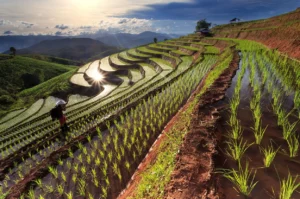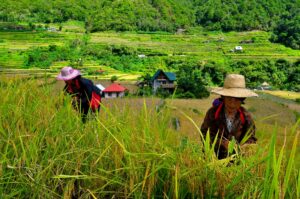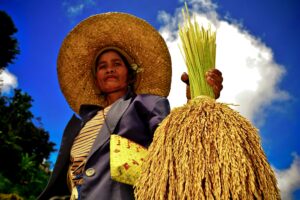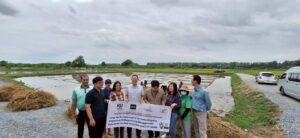by Kenneth L. McNally and Amelia Henry
Traditional rice varieties have been critical for developing improved stress-tolerant rice varieties. Tools to analyze the genome sequences of traditional varieties are accelerating the identification and deployment of genes conferring climate-change resilience.
Traditional varieties have served as critical sources of stress tolerance that can be deployed through crop breeding to improve varieties that are stress-sensitive but high-yielding under favorable conditions. Examples of such “upgrading” of existing varieties to improve their adaptation to changing climate conditions include sub1 varieties (for submergence tolerance) and DRR42 (for drought tolerance).
Important resources enabling the exploitation of traditional varieties are the genetic stocks (which have been purified from the traditional variety by single seed descent to ensure they are not mixed with other varieties), their genomic data, and tools that perform genetic analysis to identify potential stress-tolerant donors and favorable haplotypes.
An important set of genetic stocks used extensively by the global community is the diverse set of 3,000 rice genomes (3K RG) originating from 89 countries, all of which have been sequenced.
This detailed 3K RG analyses has had 89k accesses and 699 Web of Science citations, indicating the work is of broad interest. The SNP-Seek database provides access to the 3K RGsequence data and provides tools facilitating analysis for gene discovery of climate change–related traits, nutrition, yield, and other traits.
Since 2014, SNP-Seek has served 212,581 sessions from 163 countries, with an average of 50 sessions per day (via Google Analytics). Through SNP-Seek, users can further explore identified genomic regions for given traits to help pinpoint genes and markers that can be used in breeding, for example, by obtaining variant matrices, exploring annotations of regions (including alignments and variants), constructing haplotypes that define ne the patterns, and supporting candidate genes in peaks after association analysis by adding evidence.
Another tool enabling analyses of single nucleotide polymorphism (SNP) variants is the Crop Galaxy. Using Crop Galaxy and SNP-Seek variants, clients without access to advanced computing environments can accomplish genome-wide association studies (GWAS) and conduct post-GWAS analyses via the Galaxy web-based platform without installing tools on their local systems.
This may be of particular interest to scientists in regions with limited computing infrastructure. These tools are already being used to discover traits important for adaptation to climate change, such as tolerance to salinity, drought, heat, and cold. Some examples using the diversity panels from the 3K RG for GWAS and candidate gene discovery follow.
Concurrent with climate change, there is an increasing global demand for rice that necessitates that rice breeding must target improved stress tolerance as well as genetic gain, i.e., consistently increasing yield. To this end, IRRI has implemented the new OneRice breeding strategy that involves stage gates to develop varieties adapted to climate change–related stresses in a given region, rather than upgrading individual varieties for tolerance to a single stress.
It implements elite × elite crossing, with novel alleles added for needed traits. The OneRice Trait Development pipeline for pre-breeding links the International Rice Genebank (IRG) to the elite breeding pool by providing guidelines for donor identification, gene/quantitative trait locus (QTL) introgression, validation, and development of “improved elite” lines that can be used in elite × elite crossing
The genebank tools described here are critical for moving promising traits/genes/QTLs forward in the Trait Development Pipeline.
Going beyond the 3K RG, we envision that the decreasing trend in sequencing costs will enable the sequencing of all 130,000 accessions in the IRG collection in the near future, creating what would be the Digital Rice Genebank.
A matter of global concern is the dematerialization of in-trust germplasm since digital sequence information (DSI) can guide genome editing, bypassing the need for seed, and thus disrupt the access and benefit-sharing aspects embodied by the Nagoya Protocol of the Convention on Biological Diversity and the International Treaty for Plant Genetic Resources in Food and Agriculture (ITPGRFA).
Policy discussions among parties of the CBD and ITPGRFA, CGIAR scientists, and other concerned plant scientists must be resolved respecting farmers’ rights and ensuring that seed and DSI remain global public goods to be used for the benefit of humanity.
The DRB is being initiated by sequencing 10,000 additional Genebank accessions in collaboration with Prof. Rod Wing (KAUST and University of Arizona) and colleagues. These sequences, combined with 3K RG data and analyzed with high-quality reference genomes will further enable improvements in rice to mitigate climate change-related stress.
Creating multiple omics datasets (e.g., transcriptome, proteome, and metabolome) on selected subsets followed by integration/annotation of these data in SNP-Seek will improve the identification of genes involved in climate change.
In addition to improving the available resources to mine valuable climate change-related alleles from traditional rice varieties, a stronger linkage between genebank-related work and current breeding objectives is needed.
To this end, the inclusion of more sequence information on released varieties and breeding lines in SNP-Seek is underway. Combined analysis of varieties and diverse traditional varieties promises to pinpoint the best sources and haplotypes for inclusion in breeding programs targeting stress improvement for climate change traits.
Read the study:
McNally KL, Henry A (2023) Tools for using the International Rice Genebank to breed for climate-resilient varieties. PLoS Biol 21(7): e3002215.






